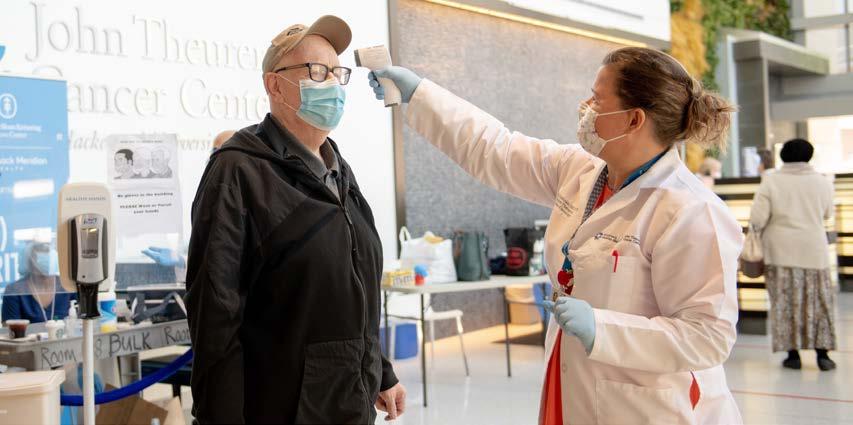
10 minute read
On the Cover: Hackensack Meridian Health urges patients not to delay medical treatment due to COVID-19 fears
Bergen County CARES
Providing relief to small businesses and municipalities impacted by COVID-19
Advertisement
Bergen County Executive Jim Tedesco announces that the County of Bergen will launch a grant program to provide relief for municipalities straddled with expenses related to the COVID-19 pandemic and small businesses financially impacted by the government ordered shutdown. The programs, which utilize CARES Act relief funds, will provide direct reimbursement to municipalities for costs associated with health officials, law enforcement, personal protective equipment (PPE) and social distancing improvements. “Nonessential” businesses that were forced to close as a measure to stop the spread of COVID-19 can receive up to $10,000 in financial relief to cover rent, property mortgage, and utilities expenses.
“The COVID-19 pandemic has had a serious financial impact on governments and business communities across the country. It is important that we use available resources to support the municipalities in their efforts to combat the spread of the pandemic and one of the hardest hit sectors, small, mom and pop shops, who were forced to close their doors. These local businesses are the backbone of Main Street, Bergen County and it is important to support our fellow neighbors as we begin to reopen. This is why I am proud to announce the Bergen County CARES Municipal Reimbursement and Small Business Grant Programs,” said Bergen County Executive Jim Tedesco.
“We understand our small Main Street businesses deemed non-essential during the shutdown have struggled to survive. Your continued survival and thriving is essential to us in Bergen County, and we encourage you to apply for this assistance with your rent, business mortgage, utility or other costs,” said Bergen County Freeholder Chairwoman Mary Amoroso. “We are also sensitive to the challenges our municipalities face to provide the critical resources needed to end this pandemic.”
Under the Bergen CARES Municipal Reimbursement Program, all 70 municipalities are entitled to direct reimbursement from the County for COVID-19 related expenses identified in the Coronavirus Aid, Relief, and Economic Security (CARES) Act. These expenses include payroll expenses for health care workers and public safety employees, PPE and building improvements.
To qualify for the Bergen County CARES Small Business Grant program, scheduled to receive applications mid-July, businesses must fall under the following criteria: • Businesses with a physical location in Bergen County, NJ. Homebased businesses are eligible. • Businesses deemed “non-essential” within the classification of “Businesses Required to Close” as per the Governor’s Executive Order No. 104, dated March 16, 2020 • Businesses with 1 – 19 full-time employees • Sole-proprietorships; LLCs; LLPs; Corporations; and S-Corporations are eligible.
Businesses owned by county employees and elected officials, as well as their immediate families, are not eligible Businesses must have been open and operating on March 1, 2020
Priority will first be given to businesses who have not received any Federal grant assistance, New Jersey Economic Development Authority grants or US Small Business Administration grant or other grant assistance.
The Bergen County CARES Municipal Reimbursement and Small Business Grant Programs are funded through the Coronavirus Aid, Relief and Economic Security (CARES) Act Federal relief fund. The County of Bergen intends to begin accepting applications for both programs by the end of June. A subsequent announcement will be made regarding the small business grant application process. Questions about the County’s grant programs can be sent to BergenCountyCares@co.bergen.nj.us.
Beyond COVID-19 Helpful tips for business recovery and resiliency

As businesses set their sights on recovery and start adjusting to a “new normal” post-COVID-19, it can be difficult to process everything that must be done in order to progress past this pandemic. Below, we’ve provided a brief overview of tips involving your stakeholders, employees, and your organization itself that you should take into consideration when embarking on the path to business recovery:
Customers and partners
Regularly update and reach out to your relevant stakeholders. These include creditors, investors, suppliers, legal teams, and of course, consumers. Everyone involved in your business operations should know the latest about the goings on of your organization, what you’re doing to move forward, and how the decisions you make coming out of this crisis are going to affect them. Especially at a time like this, maintaining your organization’s relationship with its stakeholders can make a world of difference in your prospects for future success.
Anticipate a change in your consumers’ preferences. This pandemic and its subsequent shutdown will undoubtedly leave a lasting cultural impact that’s going to influence how and where everyone spends their money.
As an organization, you’re going to have to survey the current landscape to determine what your customers value as they gradually come out of their homes. They might feel more comfortable returning to a restaurant in town with their families before they start visiting movie theaters or apparel stores, and you’ll need to plan and adjust accordingly. For instance, if you’re a nonessential business that sells packageable and deliverable products, you might want to make the switch to e-commerce – and be sure to let your loyal customers know.
Communicate clearly with your customers. During such a confusing time, consumers might value organizations that keep in touch with them more highly than they do those that keep them in the dark. Consider sending email blasts about the future of your business operations and the availability of your products, or updating your social media pages with relevant information that your followers can turn to if they have any questions about your service.
Employees
Make wellbeing a priority. Throughout the process of rebuilding, your top consideration should be prioritizing the safety and wellbeing of your employees. Establish transparent communication between management and workers and deliver frequent updates to your workforce, all while making the health of every individual a primary concern. You simply cannot afford to put anyone’s health in jeopardy for the sake of your company.
Consider continuing remote work. Although it isn’t feasible for certain jobs to be done remotely, if possible, consider continuing remote operations and devising strategies to make it more effective. We’re certainly entering a new culture characterized by the rise of remote work, and if it keeps everyone safer than they would be in a physical office space, it might be best to incorporate it as a regular manner of operating until the COVID-19 situation officially settles down.
On the other hand, if you do need to call your employees back to a physical workspace, make sure you at least institute protection measures against infections. Of course, any decisions you make should be in line with the latest public health measures and you want every one of your employees to feel safe while they’re at work.
Take feedback from your employees. Every organization is human at its core, and this truth is by no means one that you should take lightly. Make sure you know how well your employees are faring under the current conditions, remain open to suggestions about how your business can improve and adapt accordingly. Your workers are the driving force that keep your organization up and running so it’s important to provide them with the necessary support – and take their comments and expectations into consideration when moving forward.
Internal management
Go back to the basics. As you make the transition into this new normal, it’s worth revisiting the foundations of your organization. Who are you as a collective entity? What are your core values as a company or small business? Independent of your stakeholders, you need to be well acquainted with exactly what you stand for and what your mission is. This should help guide your decisions moving forward, making sure you remain consistent with a true objective and identity.
Make up for lost time. It’s important that you act fast during this time period and adopt a startup mentality, seriously considering and seizing every opportunity to recover your
revenue. Consider decentralizing your operations and creating management teams in order to expedite your decisionmaking processes; time is absolutely of the essence. If you want to rapidly make back at least some of the money you lost during closure, you need to be hyperaware of the opportunities available to your business, and you can’t be afraid to prioritize and act on these opportunities as quickly as possible.
Take full advantage of your available resources. These include all potential technological and governmental support. Utilize software to better manage your operations — for instance, consider shifting to virtual accounting instead of spending valuable time sifting through physical financial documents — and use digital solutions for further speed and productivity. Considering that many consumers virtually live online nowadays, you might also want to adopt social media and digital communications as part of your business model.
Also remain aware of what governmental support programs are applicable to your organization’s situation; when adapting to the new normal, you’re likely going to need all the financial help you can get.
Revisit your business continuity strategy. As the economy begins to start back up, you’re bound to experience a relatively slow period of growth, especially because of recent international inactivity and changing consumer preferences. In order to fully recover, think about how you’re going to grow moving forward. Monitor your short-term cash flow in order to make predictions about the future of your revenue and consider alternative supply chain options if your current suppliers are in particularly affected areas of the globe.
Restarting your business operations after a period of closure can seem like an incredibly daunting uphill battle, but with the correct priorities and the willingness to adapt in mind, it’s certainly possible to pave your own way back to success.

Cailin Lansang is a Digital Media Intern for Meadowlands Media. She is currently a senior at Bergen County Technical High School in Teterboro, majoring in Digital Media, and will be attending Columbia University this fall as a prospective English major. She can be contacted at cailin.lansang@yahoo.com.
NAVIGATING THE LEGAL LANDSCAPE FOR NEW JERSEY BUSINESSES


- Corporate Transactions - Business Law - Mergers & Acquisitions - Intellectual Property - Technology Law - Criminal Defense
- Creditors’ Rights - Tax, Trusts & Estates - Commercial Real Estate - Environmental - Infrastructure - Land Use
- Litigation - Labor & Employment - Cannabis Law
- Regulatory & Compliance

1100 Valley Brook Ave., PO Box 790, Lyndhurst, NJ 07071
www.sh-law.com |
201-896-4100
Temperature screening at John Theurer Cancer Center at Hackensack University Medical Center

Hackensack Meridian Health Urges Patients Not to Delay Medical Treatment Due to COVID-19 Fears Enhanced safety measures across Hackensack Meridian Health facilities prioritize patient safety
When COVID-19 hit, Trisha Wishard, 63, was afraid she wouldn’t be able to get the chemotherapy and radiation therapy she needed to fight her stage 1 breast cancer. Fortunately, she has been able to keep every appointment and attend every treatment at John Theurer Cancer Center part of Hackensack University Medical Center, where her chemotherapy was directed by medical oncologist Deena Atieh Graham, M.D. — with enhanced precautions designed to keep her safe.
“I didn’t want to be set back,” contended Trisha, director of operations for a staffing firm in Rutherford, who lives in Clifton with her husband, Bill and her son BJ. “I wanted to get everything done as quickly as possible – it’s important to keep up with your treatment.”
Enhanced network-wide patient safety protocols
Trisha’s advice also applies across the full spectrum of medical care — from emergency treatment to preventive care — and is echoed by Hackensack Meridian team members, who are concerned about the potential negative health impacts for community members who choose to put off necessary healthcare services.
To ensure a safe environment for non-COVID-19 patients, Hackensack Meridian team members are continually monitoring COVID-19 conditions and following enhanced pandemic safety measures when providing all types of in-person care.
“Our safety procedures are designed to ensure that the risk of a patient catching COVID-19 in a healthcare setting is extremely low, and we are urging members of our communities not to delay treatment — especially if they are experiencing
Trisha Wishard

symptoms of a heart attack or stroke, or have another type of health emergency,” said Mark D. Sparta, FACHE, president and chief hospital executive, Hackensack University Medical Center. “As our region recovers and reopens, the Emergency Department, the hospital and our other care facilities are open, safe, and ready to provide the services you need.”
For example, all patients who stay at Hackensack Meridian hospitals are tested for COVID-19. At this time, most patients at Hackensack Meridian hospitals do not have COVID-19. The facilities also maintain separate treatment areas for non








